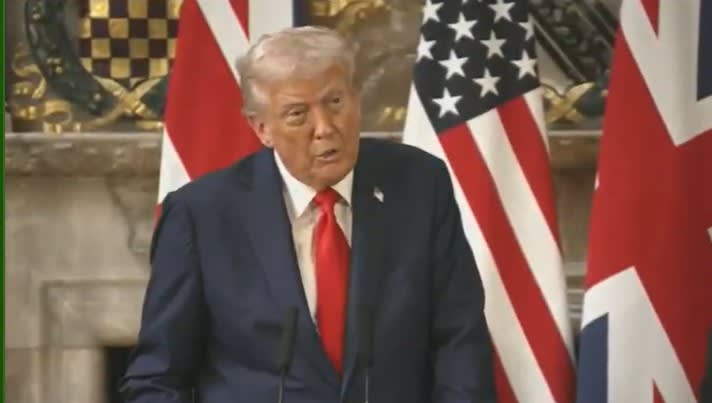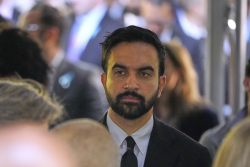Earlier this week, comedian Jimmy Kimmel delivered his monologue, as he does at the beginning of every episode of his show, Jimmy Kimmel Live!. He focused on the reaction to the assassination of conservative media figure Charlie Kirk, and claimed that "the MAGA gang" was "desperately trying to characterize this kid who murdered Charlie Kirk as anything other than one of them."
In addition to not being very funny, the observation rested on a false assumption—that the presumed killer, 22-year-old Utah man Tyler Robinson, is a conservative. Incorrect notions about the suspect's political tribe have remained enduringly popular in liberal media circles; one of the top mainstream liberal Substack writers, Heather Cox Richardson, wrote earlier this week that the motive of the alleged shooter "remains unclear." This is simply not true: Interviews with Robinson's friends and family members, as well as text messages between Robinson and his roommate—his transgender romantic partner—paint a clear portrait of a man who found Kirk's conservative views "harmful." It's fine to leave room for new details that further elucidates or complicates this picture, but for now the totality of the available information suggests an essentially left-wing motivation.
While Kimmel is a comedian rather than a newscaster, given how paranoid the mainstream media is about the spread of so-called misinformation, the criticism of Kimmel on this subject was well-deserved. And I had been planning to criticize him in this newsletter all week.
Unfortunately, the story no longer ends there.
Brendan Carr, chair of Federal Communications Commission (FCC), weighed in on the matter; not only did he criticize what Kimmel had to say, he also implicitly threatened the broadcasters. (Kimmel's show appears on ABC.)
"We can do this the easy way or the hard way," said Carr during an appearance on conservative influencer Benny Johnson's podcast. "These companies can find ways to change conduct, to take action, frankly on Kimmel, or there's going to be additional work for the FCC."
This was not an idle threat. The FCC licenses broadcast channels, and can fine them or even take them off the air. Moreover, the FCC oversees mergers of companies in the communications space. Nexstar Media, which owns many of the ABC local affiliate stations that air Kimmel, is attempting to acquire Tegna Inc., a rival firm; the FCC needs to okay the deal. There's a lot at stake, and FCC can make life very difficult for companies that defy it.
And so, on Wednesday night, both Nexstar and Sinclair Broadcast Group—another major telecommunications company—informed ABC that they would not air Kimmel on their affiliate stations. ABC then opted to place the show on indefinite hiatus. (Disclaimer: Nexstar owns Rising, the news show I host for The Hill.)
This is outrageous. Not because Kimmel is gone: Private companies have the right to determine their programming as they see fit, and a washed-up comedian telling lame jokes about a subject he is clearly misinformed on—for a declining number of viewers, as part of a media format that is antiquated and perpetually losing money—is not a recipe for riveting television. Letting Kimmel and the rest of the late night crowd go instinct is perfectly fine. It's a business decision.
But it shouldn't be a government decision. By inserting itself into the controversy and appearing to twist the arms of private companies so that they would make editorial decisions that please the Trump administration, the FCC is clearly engaged in a kind of censorship.
As Glenn Greenwald put it, "This shouldn't be a complicated or difficult dichotomy to understand. Jimmy Kimmel is repulsive, but the state has no role in threatening companies to fire on-air voices it dislikes or who the state believes is spreading "disinformation," which is exactly what happened here."
This shouldn't be a complicated or difficult dichotomy to understand.
Jimmy Kimmel is repulsive, but the state has no role in threatening companies to fire on-air voices it dislikes or who the state believes is spreading "disinformation," which is exactly what happened here: https://t.co/xmmFs3ngJH
— Glenn Greenwald (@ggreenwald) September 18, 2025
Boneheaded
Moreover, the Trump administrations actions are functionally equivalent to the Biden administration's attacks on private social media companies, which caused numerous free speech infringements during the COVID-19 pandemic. I explored this subject in great detail in my March 2023 cover story for Reason, "How the CDC Became the Speech Police," which explored federal officials efforts to coerce Facebook, Google, and X into taking down content. In that article, I reported that social media companies routinely felt compelled to compromise their explicit terms of service as well as their stated commitments to free speech in order to appease both the CDC and the White House itself. I pointed out that threats by President Biden—who accused Facebook of "killing people" when it declined to censor anti-vaccine content—as well as his comms staffers were likely motivating factors behind a whole host of regrettable moderation decisions.
When government employees use the threat of regulation, fines, and other forms of punishment to induce private companies into self-censorship, it's known as jawboning. Whether the practice violates the First Amendment—which constrains the government's ability to restrict speech—is not an entirely settled matter. In Murthy v. Missouri, the Supreme Court declined to rule that the Biden administration had violated the First Amendment rights of social media users; the majority decision, however, had to do with standing, and did not actually address the arguments of the plaintiffs. Many free speech scholars rightly believe that the First Amendment rights of private media companies and their users will not be protected until and unless the Court makes clear that this sort of behavior from federal bureaucrats—jawboning—is wrong.
Ironically, FCC chair Carr has strongly denounced jawboning in the past, and in general been a strong supporter of First Amendment rights. He frequently called out the Biden administration for engaging in this very practice.
This is very concerning.
The government does not evade the First Amendment's restraints on censoring political speech by jawboning a company into suppressing it—rather, that conduct runs headlong into those constitutional restrictions, as Supreme Court law makes clear. https://t.co/FHbg6HhteY
— Brendan Carr (@BrendanCarrFCC) August 26, 2022
There is simply no way to square this circle: If it's wrong for the Biden administration to pressure social media companies to serve the public interest—as defined by Biden—and censor fraught content, then it is wrong for the Trump administration to pressure broadcasters to enforce a Trump-defined public interest.
Shortly after taking office, President Trump issued a praiseworthy executive order on "Restoring Freedom of Speech and Ending Federal Censorship." The FCC's present actions are thwarting this very noble work.
This Week on Free Media
I'm joined by Amber Duke and Niall Stanage to discuss a variety of news topics, including the assassination of Kirk and ensuing media fallout. Watch my extended discussion with Duke here, and the rest of the conversations on the Free Media YouTube channel. (Please subscribe!)
Worth Watching
I have something exciting to announce: I'm writing a novel! And for the sake of accountability, I am committed to finishing it by the end of the year.
I've been writing science fiction and fantasy on the side for years, but I've never quite gotten any of it into reasonable enough shape for publication. I do incorporate the material into the Dungeons & Dragons games I run, so I do get some use out of it. But as I've grown older, and I've transitioned from being primarily a writer to primarily a video commentator, I've noticed that it's becoming harder and harder to work on long-form creative projects.
So for the sake of my own creative rejuvenation, I'm committed to writing a complete fantasy novel. It's based on an unusually vivid dream I had a month ago, in which a northern fantasy civilization was threatened by sinister forces. I don't want to spoil anything, so that's all I can say… for now.
The post The FCC Should Let Jimmy Kimmel Be appeared first on Reason.com.













 Bengali (Bangladesh) ·
Bengali (Bangladesh) ·  English (United States) ·
English (United States) ·